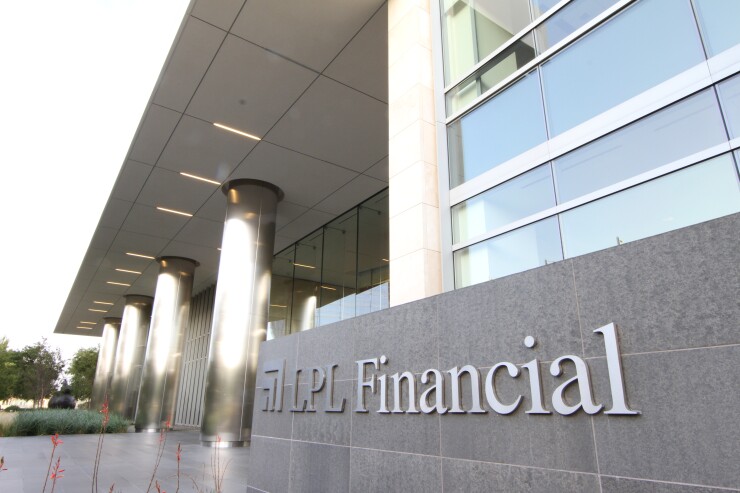
LPL Financial Holdings was hit hard by market volatility in the fourth quarter and the country's largest independent broker-dealer is girding for more rough waters in the early months of 2016.
"The market environment was volatile and challenging in 2015, particularly for brokerage sales," Mark Casady, LPL's CEO, said in a statement accompanying the earnings results. "So we focused on bringing assets onto our platform and executing on our operational, efficiency and capital plans."
Market volatility has "only increased" so far in 2016, Casady continued, "and we expect continued pressure on brokerage sales."
Net income in the fourth quarter dropped 35% from the previous quarter, to $27 million from $41 million. Compared to the fourth quarter ended 2014, earnings declined 45%, from $49 million.
The firm’s adjusted earnings of 37 cents a share missed analysts’ estimates by 14 cents.
Net revenues declined slightly in 2015 to $4.2 billion, from $4.3 billion in 2014. Advisory and brokerage assets rose 3% to $475.6 billion, while net new advisory assets slumped to $3.1 billion from $4.2 billion from the previous quarter.
EXPENSES LOWER
LPL made progress on expenses and capital, CFO Matt Audette said in a statement. "We managed our expenses slightly lower than our outlook while executing several efficiency initiatives to position us for lower G&A growth in 2016."
LPL also completed half of its $500 million share repurchase plan in the fourth quarter, Audette added. The company has repurchased another $25 million of its shares to date this year, he said.
Advisor count for the IBD was 14,054, down 19 from the third quarter, while advisor production retention finished the year above 96%. Casady had indicated in interviews with journalists last year that LPL was targeting increased advisor growth. But in the conference call with analysts, he said the static number was not a concern because advisors with small books of business were being replaced with bigger producers.
Audette told financial analysts that the first quarter of 2016 was becoming "ever more challenging."
While the industry "might be in rough waters right now," he said, LPL was confident it could grow assets, improve technology and be prepared for the upcoming Department of Labor rule.
ANTICIPATING DOL RULE AND ROBO OFFERING
Casady estimated that implementing the Labor Department’s fiduciary rule, which he anticipated would be issued in April, would take about eight months. While acknowledging its implementation would be "challenging and costly," Casady told analysts that LPL's size, scale and "variety of tools" would give it a competitive advantage in the retirement market.
Casady also told analysts that he expected LPL to unveil a robo solution for advisors this year that would help them "open up new markets," particularly children of clients and millennials.
Despite the disappointing earnings report, LPL has had some encouraging news over the past few months.
It has brought on several new firms to its platform, including ITI Strategies based in Peekskill, N.Y., and Hoyt, Lewis from Spokane, Wash.
In addition, activist investor Richard "Mick" McGuire and his hedge fund, Marcato Capital, has pared back its large stake in LPL Financial stock, selling 1.658 million shares.
LPL's stock has been slumping at even more precipitous rate than the overall market swoon, closing at $25 on Thursday, down almost 50% from its 52-week high of $48.
WELL POSITIONED
Nonetheless, says industry consultant Tim Welsh, president of Larkspur, Calif.-based Nexus Strategy, LPL is "probably the best positioned of any of the IBDs because they are of size and scale to weather the coming DOL storms and have been forced by regulators to change their ways. "
Indeed, LPL noted in its fourth quarter earnings that its "regulatory-related charges" were flat.
LPL "will now turn its sights on the next tier of problem IBD firms," Welsh predicts, "and is well situated to scoop up advisors from Cetera and possibly AIG.
"Cetera's plan to pay in retention for 9,000 advisors is about $5,500 per advisor," Welsh continues. "Merrill paid $3 billion in retention when they went bankrupt, in comparison. None of the Cetera advisors, other than the top 1% will get any meaningful payout to stay, so look for wide-scale defection and a recruiting bonanza by the well positioned industry leaders like LPL."
In addition, Welsh points out, "LPL’s other advantage is that they have a pretty robust RIA custodian business, so they can keep their wandering advisors in check and use it to play offense to capture hybrids."
Read more:





